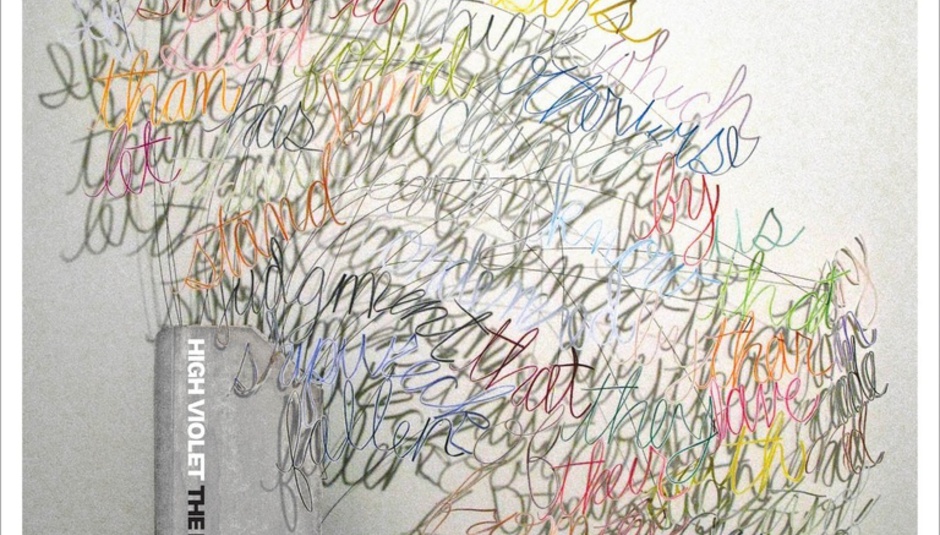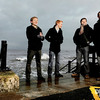IT'S BACK: DiS' Alexander Tudor, gets a first listen to The National's forthcoming album, High Violet.
Way back on their first album, Matt Berninger spelled it out for all of us: when you go to the extremes, the opposite extremes are unimaginable ("I am divine, my arms are rivers / And when you feel that way, you want to feel that way forever... ...when you feel ruined / You’re going to stay that way forever"_ - ‘John’s Star’). Accordingly, their first three albums (and their early masterpiece, the ‘Cherry Tree’ EP) were albums of extremes: songs with strings & acoustic guitars that wouldn’t be out of place on Go-Betweens or Tindersticks albums… and then massive, surging rock-songs with screamed vocals over the crescendos, ‘All the Wine’ literally quoting ‘Ribbons’ by The Sisters of Mercy.
For their fourth album, Boxer (2007), The National separated out the acoustic songs, buried the chamber-orchestration in the mix; started using trumpets, violins and cellos to supplement the wall-of-guitars, rather than breaking them up, as they’d done before. High Violet (due 10 May 2010 on 4AD) sticks with the pretty damn successful idea that The National can represent the two poles of their character by playing on the contrast between Matt Berninger’s world-weary delivery and the immense power of the arrangements behind him. So… from the top:
‘Terrible Love’
To say that ‘Terrible Love’ is a safe pick for an opening track, as well as a reliable teaser for the album (when it was aired on NBC) isn’t to say that it’s a weak song by any means. If you’re a fan, you already know this starts with a two-chord surge and rumble of guitars, building tension before the drums truly start cascading, and the backing vocals swoop in. It’s virtually an indie-rock staple, the monochrome opening track-as-extended intro; case in point, the recent Frightened Rabbit album. The key line here is “it takes an ocean not to break… this frightened company”. The ocean’s one of the recurrent motifs on the album, and while it’s one of those over-familiar symbols that can mean just about anything to anybody, it seems to be all of those things at once here: the end of the world, for Midwesterners; the thing that separates us from those we love, when we’re travelling; the great roiling of emotion and instinct, under all the words; a kind of shorthand for extreme heaviosity among post-rock and metal bands. So far so awesome…
‘Sorrow’
“sorrow found me when I was young sorrow waited, sorrow won
sorrow put me on the pier (?)
it’s in my heart, it’s in my honey, it’s in my milk
Cover me in rag and bones… sympathy
Because… I don’t want to get over you"
‘Terrible Love’ might have suggested that this would be Boxer, part 2, but the band are quickly reined in, for a slower number, spelling out that the singer’s on first name terms with Sorrow. Of course, this wouldn’t be The National without that almost undetectable Did-He-Really-Just-Say-That? sense of humour: there’s a barely audible piano line throughout that subtly echoes 'I Can’t Help Falling in Love with You', at its most minimal. Plus, just to counter-balance Elvis Presley, Berninger drops in a wry allusion to The Magnetic Fields with ‘I don’t want to get over you’ (and if it’s not intentional, it hardly matters, because Somewhere-Between-Elvis-and-Stephin-Merritt is a pretty fine place to be, in my book). More oceanic images appear in Verse 2 (“Sorrow’s my body on the waves...”) and yet again any pomposity is undercut immediately (“...Sorrow’s a girl inside a cake”).
One small observation: individual parts on this record are deceptively simple, but the effects or tones used by each player vary substantially from song to song, to avoid any samey-ness. Here, the backing vocals are bold falsetto, stuck on one note, in a way that recalls what John Cale said about his role in the Velvets – that Lou Reed would write straightforward pop songs on 3-chords, then he’d try to find the single viola drone that pierced right through them. Anyhow; on we go –
‘Anyone’s Ghost’
A more seductive groove to this one than you’d expect from The National, to soundtrack some late night prowling (“didn’t want to be your ghost / didn’t want to be anyone’s ghost…”). Vaguely reminds me of 'Love is the Drug' by Roxy Music. Three tracks in, The National establish that they aren’t going to mimic the trajectory of Boxer (i.e. an unvarying tempo, charging forwards). The band have found a way to sound powerful in their restraint. Also, there seems to have been a conscious decision to make sure the songs end briskly – no crescendo, and only the briefest middle-8 with a doubled vocal line. Key lyric: “I had a hole in the middle, where the lightning went through / I told my friends not to worry”.
‘A Little Faith’
“Little things… make me laugh
On Blackberry fields
Now we’re stuck in New York, and the rain’s coming down”
Like the previous song, manages to have a groovy undercurrent, as the bassist and drummer show off a new-found sophistication (think of how Radiohead’s rhythm section developed over their first five records). Menacing cellos saw a triplet at a time, rising up like tall buildings around you, then rest. The contrast between Berninger’s minimal, one-note vocals and the rising volume of the layers and layers of instruments builds tension until finally the singer shifts key, recognizing the urgency… and then the music dissolves into an atonal coda.
'Afraid of Everyone'
Opening with emphatically mournful backing vocals to accompany the lyric “I’m afraid of everyone…” this could be the first moment on the record that risks ridicule with its Poor Me premise, until a weird (left-channel only) guitar figure cuts through, sounding like none of the band’s usual guitar effects, almost Gang of Four in its brusqueness… and, in any case, an omen of Something Not Good.
At the very end, the lead vocal line gets chopped up, and distorted, until it becomes another weird texture; the singer completely overwhelmed, not so much torn apart in some (lame, histrionic) enactment of madness, but reduced to a sound signifying nothing, just before the loudest (Mono / Explosions in the Sky / Mogwai- style) wall-of-delayed guitars come in.
'Bloodbuzz, Ohio'
“I was carried to Ohio in a swarm of bees
I was never married, but Ohio didn’t mind me
I never thought about love, but I thought about hope”
It’s been around a while, so it’s no surprise that ‘Bloodbuzz, Ohio’ makes a devastating album centrepiece. Basically, this album’s ‘Mr November’ or ‘Murder me, Rachel’, but without the screaming. One of the tracks that would fit best on Boxer, the band pile on a trumpet fanfare, church organ, an extra drone guitar (within the eponymous bloodbuzz of swarming guitars there since the beginning), and finally quick bursts of lead guitar that strike like a pavement saw.
'Lemonworld'
I’m a little reluctant to quote the beginning of this one (at least without a caveat) because it sounds like the lyrics are “people are dying in New York… means nothing to me / I gave my heart to the army… takes a lot to kill a college man like me”. Things get progressively weirder, as Berninger either forgets the lyrics or momentarily forgets language itself, singing: “duhduh-duhduh-duhduh-duhduh / You and your sister live in a lemonworld”.
Sung with total gravitas that few (save Michael Stipe) could get away with, this could have easily fallen into the kind of rhymed nonsense or surrealism-lite too many lyricists try to pass off as arty and mysterious. It's certainly not a gabble of random images, though, and there's enough coherence to the world of the song to build up a nauseous feeling of being there, where the bikini-clad succubi / seductresses (who crop up in so many of Berninger's songs) get to “lay me on the table / put flowers in my mouth / you can say we invented a summer-lovin’ torture party...” Odd, even by Berninger’s standards, but somehow integral to the album's general unease.
'Runaway'
On most of the tracks, so far, Berninger’s voice has been at once clear and high in the mix, and yet oddly disaffected by the music, as if it stands in for the emotion he can’t quite reach, only observe in a series of images that might be nightmarish, or surreal jokes… he simply couldn’t say. On the page, ‘Runaway’ should be a massive anthem, and yet all of its intensity is conveyed with the utmost subtlety:
“there’s no saving anything
now we’re swallowing the shine of the sun…
whatever makes you think I’m enjoyin’ bein’ led to the flood?
we got another thing coming… undone
and it’s taking us over
we don’t bleed, when we don’t fight
go ahead, go ahead, throw your arms in the air tonight
we don’t bleed, when we don’t fight
go ahead, go ahead, lose your shirts in the fire tonight
whatever makes you think I’m enjoyin’ bein’ led to the flood?
we got another thing coming… undone"
Mixed so that every instrument is actually omnipresent, but can vanish from awareness at any time, this is a masterpiece of understatement reminiscent of The Crying Light, by Antony & the Johnsons. There’s the lightest, near subliminal bass-drum pulsing beneath it all, an acoustic guitar whose squeaks are louder than most of the notes, and yet all of it pulls you in irresistibly. Towards the end, the trumpets play a wistful requiem, worthy of Willard Grant Conspiracy, and in its quiet way, this could be one of the best things on the album.
‘Conversation 16’
Picking up the pace, ‘Conversation 16’ might not be a stand-out, but there’s no let-up in the attention to detail. A synth-choir takes over backing vocal duties, and the soundscape’s been neatly sculpted so that a continual trembling, delayed guitar is somewhere off to your left, while the kick-drum and toms alternate with the cymbals in the right and left. Yet again, Berninger’s troubled by the possibility that if he can’t tell how much he’s feeling what he’s feeling, then maybe all these thoughts in his brain make him Patrick Bateman?
“Leave the silver city, to all the silver girls
Cause they give us black dreams
I was afraid… I’d eat your brains
“Cause I’m eeeeevil"
‘England’
If ‘Conversation 16’ nods to American Psycho by Bret Easton Ellis, then ‘England’ is Glamorama, coincidentally or not. From the first line, “someone somewhere sent a runner / for the feelings that I lost today”, Berninger’s back in his apathetic celebrity persona, either reminding us that the people we project all our ideals onto are mostly blank screens, or reminding himself to feel something in the comedown after performance, or simply that the people who have everything want for nothing, and so forget how to feel. For the second time on the album, there’s a lyric that sounds like a nod to another great poet of melancholy, Mark Kozelek of Red House Painters: “you must be somewhere in London / loving your life in the rain” (echoing the classic ‘Katy Song’, just as “a swarm of bees / came to carry me to Ohio” echoes one of Kozelek’s later, and finest songs).
Early versions of ‘England’ suggested this would be The National’s strangest song yet, featuring a staccato vocal line, juxtaposed with comparatively complex guitar & piano lines, wrongfooting you with missed beats, and sudden key-changes halfway through a line. As it happens, the oddness has been toned down, making this relatively upbeat, with a crescendo less like a thunderstorm (as many of the others had been), and more of a gentle, violin-propelled ascent into heaven.
‘Vanderlyle Crybaby Geeks’
Slightly re-named from early appearances, ‘Vanderlyle Crybaby Geeks’ works perfectly as an album-closer… because it’s the first song on which Berninger uses more than just a narrow sliver of his vocal range, right from the start of the song. As the title suggests, it’s got a lilting, nursery rhyme rhythm in the vocal melody, and it’s also the only place on High Violet where The National obviously re-visit the alt country stylings that coloured some of their earliest songs (when they hadn’t yet differentiated themselves from most other indie fare at the beginning of the decade).
Surprisingly, for all its catchiness, this doesn’t turn into a singalong on the album… perhaps you’re meant to fill that in, in your head. (FYI, I’d already heard half the tracks on YouTube before listening to the album-proper, and by the second listen was singing along to almost every verse and chorus.) This though, is the swaying, lighters-in-the-air set-closer. Berninger keeps the melody simple, but it’s just begging to have grace notes and harmonies added, making it one of the prettiest anthems they’ve written. As in so many places, you get a dry-humoured parody of romanticism: “now it’s all been for-given / swans are a-swimming…” and then the single most memorable line on the entire album – the one that’s just crying out to become the name of a fanzine – “I’ll explain everything to… THE GEEKS!” It’s as if he’s promising the final, perfect revelation, any minute now – one that might never be heard, because the clock’s running down on the album – but it doesn’t matter because the whole album was the revelation, the manifesto for geeks.
Ultimately, it’s a terrific album, and I say that with zero reservations. Almost every track seems to race past; never outstays its welcome with an over-long crescendo or fade-out; never disrupts the flow of the album; always delivers a strong middle-8 (although never a solo, or a break). It’s going to take a few weeks to know if this rivals Boxer in my affections (since their last was a personal Top 10 record for the past decade). Likewise, we’ll just have to wait and see whether any of the songs actually displace older National classics (‘All Dolled Up in Straps’, say, or ‘Mr November’, ‘29 Years’) as perfect summations of what it means to be young, deeply romantic, but also feel terribly old at the same time; terribly cynical about the caverns of unknowing and lurking tragedy that surround every relationship, waiting to destroy it. Chances are, they’ll sit happily alongside them, the way great bands keep writing new favourites you feel like you’ve always known. So, Yes, this is immaculate, but don’t mistake it for “slick”. It’s taken The National years to get this confident, and if the heavy, dark Album # 5 is their Document (to use an REM analogy), let’s hope it's another step closer to global domination.






















